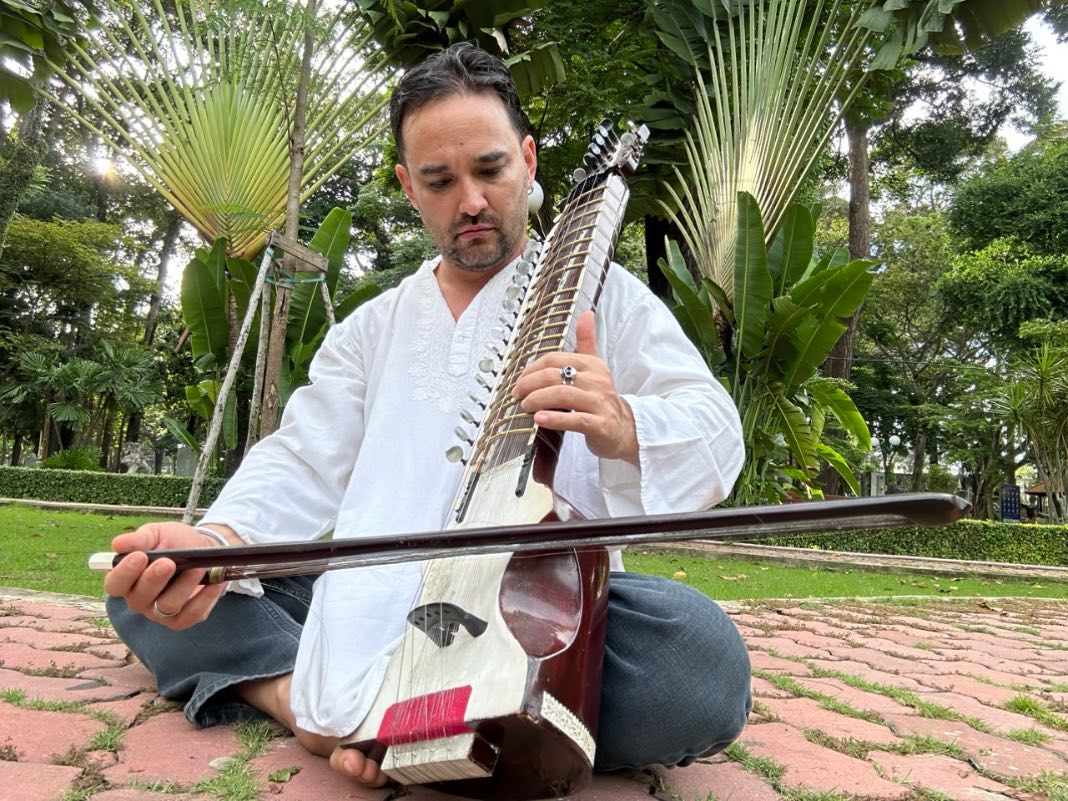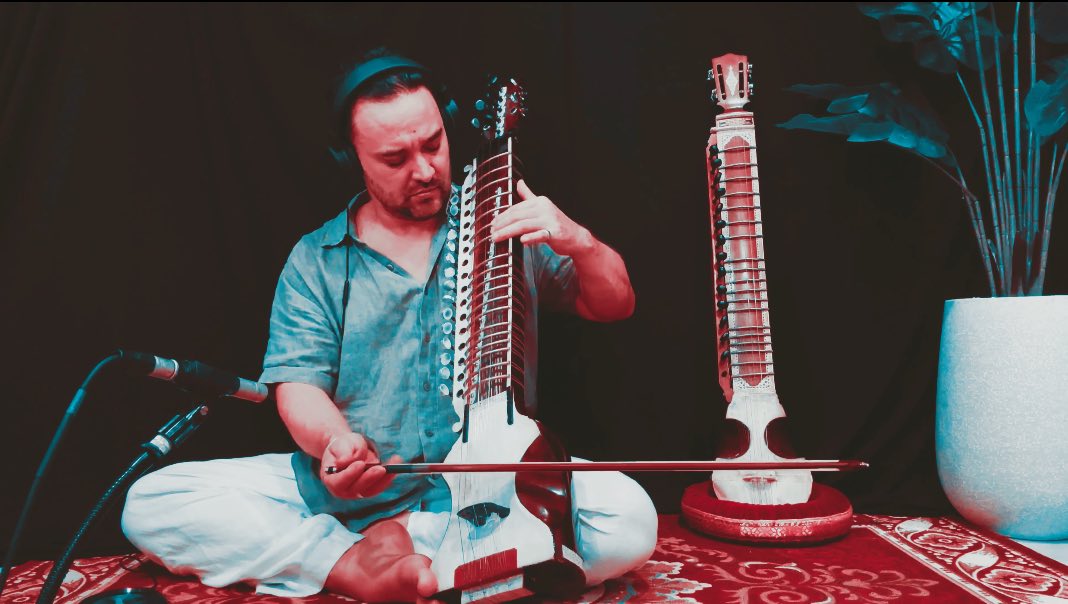After spending seven years in Saigon, Keith Beber has emerged as a vibrant force in Vietnam’s music scene, introducing a fresh wave of Indian music. Through his expertise with Indian musical instruments, Keith offers a captivating blend of traditional sounds with a contemporary twist. In an interview with The Saigon Times, Keith shares his journey and his mission to cultivate a deep appreciation for Indian music in Vietnam.
The Saigon Times: You have traveled extensively in India, Cuba, the U.K., Thailand, Canada, and Vietnam to study music. Can you tell us about your experiences in these different countries?
Keith Beber: Cuba was a particularly powerful experience for me, as it was the first country I visited outside of the U.S. at the age of 19. Despite the economic hardships caused by the embargo, the musical gatherings there were incredibly profound. In Cuba, they practice Santeria, where music and drums are integral to prayer, making music a spiritual experience rather than just entertainment. This had a huge impact on me. On my first night in Cuba, the power went out, and we played music under the stars—it was magical. That experience made me vow to pursue music for the rest of my life.
How about your experiences in other countries?
After my time in Cuba, I realized the importance of studying music at its roots. In India, I spent a month touring the country and studying various forms of music, including Sikh music. Each country I visited offered a unique perspective and added depth to my musical education, which I’ve absorbed and incorporated into my own style. For example, in India, the spiritual and classical traditions gave me a new understanding of rhythm and melody. In the UK, the vibrant music scene and access to world-class musicians and educators greatly enhanced my technical skills. Thailand and Canada also contributed their own unique cultural elements and performance experiences.
Now that you are in Vietnam, have any specific Vietnamese instruments caught your attention?
Yes, there is a Vietnamese percussion instrument called the “senh tien.” It consists of two sticks with coins attached, which create a unique sound when clapped together. It is quite interesting, and I have enjoyed learning about it. The distinct sound of the senh tien is fascinating and adds a special texture to the music. It has been a delightful experience to explore its use in different musical contexts.

Have you thought about integrating Vietnamese musical elements into your performances?
Absolutely. I have played with traditional Vietnamese artists and I am exploring the idea of combining Vietnamese music, like cai luong, with electronic music. Collaborating with local musicians is definitely on my agenda. This fusion creates a unique sound that bridges cultural gaps and brings a fresh perspective to traditional tunes.
Could you mention some achievements that you are proud to share?
One of my earliest performing experiences, was performing for the Buddhist community at World Peace culture festivals. In Detroit, I had the honor of playing with legendary musicians, such as Allee Willis, Larry Frantangelo, Terrence Parker and so on . I was also fortunate to record with notable artists like Alan Barnes and Mike Clark. Currently, I’m excited about my band, Osoko, an international group creating something new together. Playing with such diverse and talented musicians has been incredibly rewarding and has expanded my musical horizons significantly.
What was your first performance in Vietnam like?
My first major performance in Vietnam was at the Quest Festival in Hanoi at the end of 2016. It was a large audience, and we played alongside great bands. It was an incredible way to enter the Vietnamese music scene. The energy and enthusiasm of the audience were contagious, making it an unforgettable experience. It set the tone for my journey in Vietnam and motivated me to delve deeper into the local music culture.
What do you enjoy most about the musical community and culture in Vietnam?
I love the communal aspect of music here. Seeing people gather on the streets, playing and singing with no reservations, is beautiful. The bolero music during Tet and the casual karaoke sessions are something I really appreciate. It is so natural and vibrant. This communal spirit fosters a deep connection among people and creates a lively, inclusive environment for music. It is inspiring to see how music is integrated into daily life, making it an essential part of the cultural fabric.
As an instructor, what advice would you give to musicians, especially youngsters, who want to pursue a career like yours?
First, go to local jam sessions and open mic nights to connect with other musicians. Building connections is crucial. Also, have a clear plan and stay focused. It’s easy to get carried away in a vibrant city like Saigon, but discipline and clear goals are essential. Staying dedicated to your craft and continuously seeking opportunities for growth and collaboration is important. Networking and persistence are key to building a successful career in music.
With regard to teaching music, can you tell us about your courses and how people can enroll?
I have a website, KeithBeber.com, where I offer courses on Esraj and Dilruba which is basically like an Indian Violin. I teach both in-person and online. In person, I teach World percussion. Everything from Drumset, to Afro Cuban, Brazillian, Arabic, and Indian Percussion. Lessons, are typically VND500,000 each. Students don’t need their own instruments to start; I have some available for use. My goal is to make music education accessible and enjoyable for everyone, regardless of their level of experience.

What are your thoughts on the popularity of Indian music in Vietnam and globally?
Indian music is definitely growing in popularity worldwide, thanks to platforms like YouTube. However, in Vietnam, it has not grown much yet. I hope to find and connect with people interested in Indian classical music and contribute to its growth here. There’s a rich tradition in Indian music that I believe would resonate well with Vietnamese audiences, and I’m excited to explore ways to introduce and integrate it into the local music scene.
What is the biggest challenge you face in your musical journey, and how do you balance your passion with financial stability?
The biggest challenge is the expense of traveling and paying for lessons. I’ve studied many different instruments and styles of music to remain flexible and continuously work on various projects. Teaching, both in-person and online, along with multiple streams of income, helps me balance my passion with financial stability. It’s about finding a balance between pursuing artistic endeavors and ensuring a steady income to sustain those efforts.
Lastly, what do you enjoy most about the musical culture in Vietnam?
I love how music is a communal activity here. Seeing people sitting out on the streets, playing music and singing, is heartwarming. It is a very natural and vibrant part of Vietnamese culture that I really appreciate. The spontaneity and inclusiveness of musical gatherings here create a unique atmosphere that is both welcoming and inspiring. It is a testament to the strong cultural ties and the importance of music in everyday life.
Reported by The Ky









